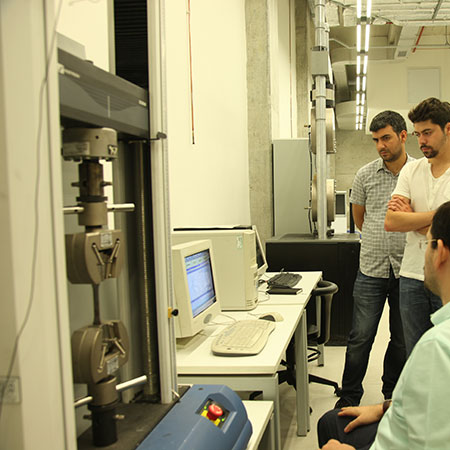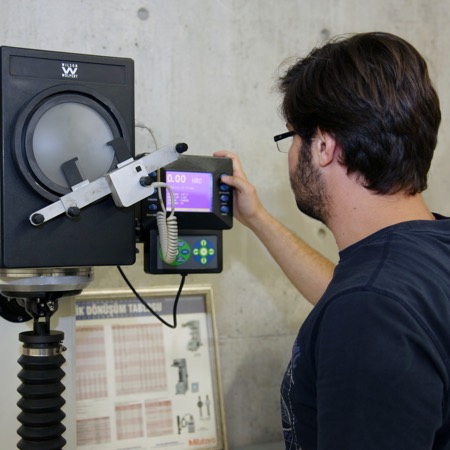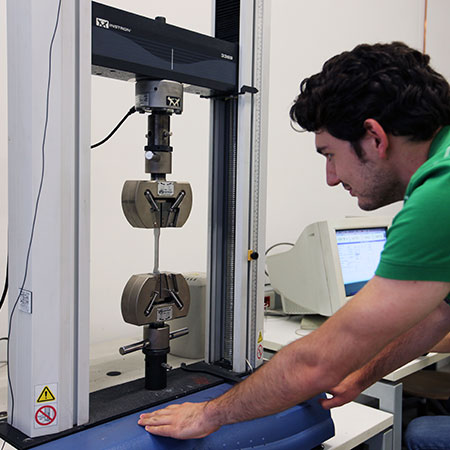Computer Engineering Graduate Programs
(For Those Admitted In Fall 2017-2018 or Later)
Computer Engineering Master's Programs (With Thesis)
Master's programs with thesis should be completed within a maximum of 4 semesters. Students who have successfully completed the course load and the seminar, but fail to submit a thesis defense due to the failure to complete the work on the dissertation within 4 semesters can be granted a maximum extension of 2 semesters. Time spent for the scientific preparation program will not be included in the time frame stipulated for the master's program. The master's program with thesis is structured as follows:
- BİL 531 - Algorithm Analysis (3 credits)
- 1 course from the field of Artificial Intelligence (3 credits)
- 1 course from the field of Theory (3 credits)
- 1 course from the field of Information Security and Computer Networks (3 credits)
- 1 course from the field of Data Sciences (3 credits)
- 2 elective courses (6 credits)
- BİL 597 Seminar (no credit)
- BİL 599 Dissertation (no credit)
- Second and subsequent courses taken from a specific field are considered electives.
Computer Engineering Master's Programs (Without Thesis)
Master's programs without thesis should be completed within a maximum of 4 semesters. Students who fail to complete the program within the said time frame can be granted a maximum extension of 2 semesters. Time spent for the scientific preparation program will not be included in the time frame stipulated for the master's program. The master's program without thesis is structured as follows:
- BİL 531 - Algorithm Analysis (3 credits)
- 1 course from the field of Artificial Intelligence (3 credits)
- 1 course from the field of Theory (3 credits)
- 1 course from the field of Information Security and Computer Networks (3 credits)
- 1 course from the field of Data Sciences (3 credits)
- 5 elective courses (18 credits)
- BİL 598 Graduation Project (no credit)
- Second and subsequent courses taken from a specific field are considered electives.
Courses in the field of Artificial Intelligence
| Course Code | Course Title | Credits |
| BİL 541 | Artificial Intelligence | 3 Credits |
| BİL 542 | Artificial Neural Networks | 3 Credits |
| BİL 564 | Pattern Recognition | 3 Credits |
| BİL 570 | Artificial Learning | 3 Credits |
| BİL 574 | The Applications of Artificial Intelligence in Finance | 3 Credits |
Courses in the field of Theory
| Course Code | Course Title | Credits |
| BİL 504 | Algorithmic Game Theory | 3 Credits |
| BİL 514 | Computation Theory | 3 Credits |
| BİL 589 | Graph Theory | 3 Credits |
| BİL 536 | Convergence Algorithms | 3 Credits |
| BİL 537 | Randomized Algorithms | 3 Credits |
| BİL 535 | Computational Geometry | 3 Credits |
Courses in the field of Information Security and Computer Networks
| Course Code | Course Title | Credits |
| BİL 520 | Introduction to Cyber Security | 3 Credits |
| BİL 548 | Internet Security Protocols | 3 Credits |
| BİL 553 | Internet and Data Security | 3 Credits |
| BİL 525 | Forensics Analysis of Networks | 3 Credits |
| BİL 527 | Network Defense Systems | 3 Credits |
Courses in the field of Data Sciences
| Course Code | Course Title | Credits |
| BİL 501 | Distributed Data Processing and Analysis | 3 Credits |
| BİL 546 | Semantic Web | 3 Credits |
| BİL 564 | Pattern Recognition | 3 Credits |
| BİL 573 | Data Mining | 3 Credits |
| BİL 595 | Bioinformatics | 3 Credits |
Electives
Any other courses with BİL 500 or 600 codes
Electives with BİL 400 can be taken with the approval of the Department Chair
| Course Code | Course Title | Credits |
| END 501 | Advanced Linear Programming | 3 Credits |
| END 502 | Integer Programming | 3 Credits |
| END 503 | Non-Linear Programming | 3 Credits |
| END 506 | Stochastic Programming | 3 Credits |
| END 550 | Fuzzy Set and Logic Theory | 3 Credits |
| END 561 | Advanced Statistical Methods | 3 Credits |
| END 562 | Time Series Analyses and Estimation | 3 Credits |
| END 570 | Stochastic Processes | 3 Credits |
| END 571 | Queue Systems | 3 Credits |
| END 572 | Markov and Renewal Processes | 3 Credits |
| ELE 501 | Linear Systems | 3 Credits |
| ELE 504 | Digital Control Systems | 3 Credits |
| ELE 571 | Digital Signal Processing | 3 Credits |
| ELE 562 | Satellite Communication Systems | 3 Credits |
| ELE 564 | Digital Communications | 3 Credits |
| ELE 565 | Information Theory | 3 Credits |
| ELE 524 | CMOS VLSI Design | 3 Credits |
| MAK 552 | Introduction to Biomechanics | 3 Credits |
| İKT 511 | Microeconomics 1 | 3 Credits |
| MAT 533 | Real Analysis 1 | 3 Credits |
| MAT 534 | Real Analysis 2 | 3 Credits |
| END 504 | Grid Models and Optimization | 3 Credits |
| ELE 569 | Optimization of Communication Networks | 3 Credits |
(For Those Admitted Before Fall 2017-2018)
Master's Program (With Thesis)
Master's programs with thesis should be completed within a maximum of 4 semesters. Students who have successfully completed the course load and the seminar, but fail to take the thesis defense due to the failure to complete the work on the dissertation within 4 semesters can be granted a extension of 2 semesters. The master's program with thesis is structured as follows:
- 1 course from the field of Computer Sciences Theory (3 credits)
- 1 course from the field of Software (3 credits)
- 1 course from the field of System (3 credits)
- 4 elective courses (12 credits)
- BİL 597 Seminar (no credit)
- BİL 599 Dissertation (no credit)
- FBE 600 Scientific Research Techniques and Publication Ethics (no credit - must)
Master's Program (Without Thesis)
Master's programs without thesis should be completed within a maximum of 4 semesters. Students who fail to complete the program within the said time frame can be granted a maximum extension of 2 semesters. Time spent for the scientific preparation program will not be included in the time frame stipulated for the master's program.The master's program without thesis is structured as follows:
- 1 course from the field of Computer Sciences Theory (3 credits)
- 1 course from the field of Software (3 credits)
- 1 course from the field of System (3 credits)
- 7 elective courses (21 credits)
- BİL 598 Graduation Project (no credit)
- FBE 600 Scientific Research Techniques and Publication Ethics (no credit - must)
Courses in the field of Software
| Course Code | Course Title | Credits |
| BİL 501 | Distributed Data | 3 Credits |
| BİL 508 | Web Design and Development | 3 Credits |
| BİL 511 | Object-Oriented Design and Programming | 3 Credits |
| Java and the concepts of object-oriented programming. Object-oriented program design using UML. Exceptions, sub-routine programming, I/O, registers and streams. Threads and garbage collection, networks, sockets and packages. Java API packages. Applets. AWT, JFC swing. Database connectivity. Web programming. Servlets Fundamentals of HTTP Servlet. Lifecycle of Servlets. Applets and DHTML as Servlet clients. Session management. Introduction to JSP.Object-Oriented Desing and Patterns, Cay Horstmann, Wiley, 2004 | ||
| BİL 513 | Internet Programming | 3 Credits |
| Internet programming media. Page design using HTML and DHTML. Javascript. Web servers. CGI, SSI, SSL, Cookies and XML. Development of recursive internet applications. New models of web programming. Web services and Ajax. Developing dynamic web pages. PHP language.Internet & World Wide Web How to Program, 2/e, H.M. Deitel | ||
| BİL 515 | Advanced Object-Oriented Programming with Java and C# | 3 Credits |
| Concepts of object-oriented programming with Java and C#. Object-oriented program design using UML. Exceptions, sub-routine programming, I/O, registers and streams. Threads and garbage collection, networks, sockets and packages. Java API packages. Applets. AWT, JFC swing. Database connectivity. Web programming. Servlets Fundamentals of HTTP Servlet. Lifecycle of Servlets. Applets and DHTML as Servlet clients. Session management. Introduction to JSP. | ||
| BİL 519 | Web Services | 3 Credits |
| BİL 546 | Semantic Web | 3 Credits |
| BİL 554 | Internet-Based Application Development | 3 Credits |
| BİL 582 | Software Engineering | 3 Credits |
| Software project management: criteria, estimations and planning. Software requirements analysis techniques. Software design techniques. Software adaptation. Software quality assurance. Software testing and maintenance. Comparison of case technologies. | ||
| BİL 584 | Software Project Management | 3 Credits |
| BİL 588 | Advanced Issues in Software Engineering | 3 Credits |
Courses in the field of System
| Course Code | Course Title | Credits |
| BİL 533 | Parallel Computation | 3 Credits |
| BİL 548 | Internet Security Protocols | 3 Credits |
| BİL 551 | Data Communications and Computer Networks | 3 Credits |
| BİL 552 | Internet Architecture | 3 Credits |
| Addressing, Protocols, Servers, PPP, Access Methods, Internet Backbone, VPN, Mobile IP, VoIP, Internet Network Administration, Computer Networks, A.S. Tanenbaum, Prentice Hall International, 3rd Ed., 1996, ISBN: 0-13-349945-6 | ||
| BİL 553 | Internet and Data Security | 3 Credits |
| Cryptography Techniques and Algorithms, Public-Key Cryptography, Digital Signature, Network Security, Viruses, Firewalls, Internet Data Security Techniques.1. Defending Your Digital Assets Against Hackers, Crackers, Spies and Thieves. R.Nichols, D. Ryan, and J. Ryan. McGraw-Hill, 2000. | ||
| BİL 557 | Wireless Networks | 3 Credits |
| Fundamentals of wireless communications, modulation, multi-access methods, wireless LAN, IEEE 802.11, Bluetooth, wireless network layer, ad-hoc networks, security of wireless networks. | ||
| BİL 562 | Microprocessors | 3 Credits |
| BİL 565 | Computer Architecture | 3 Credits |
| Pipeline technique. Application of the pipeline technique on microprocessors: command line. Data direction, dynamic scheduling, renaming registers, estimate-based execution. Software-based scheduling: Software pipelines, breaking cycles. Supporting interrupts with out-of-order processors. Modern methods used in the branch prediction. Features and design issues concerning multiple-thread processors (processing more than one command per cycle). Memory systems: DRAM, cache, virtual memory, TLB, register memory. Very Long Instruction Word (VLIW) architectures and EPIC. Simultaneous multi-threading and multi-core processors. Cases: Pentium 3, Pentium 4, Alpha 264, Itanium.Computer Architecture: a Quantitative Approach, John L. Hennessy ve David A.Patterson, Third Edition, Morgan Kaufman, 2002. | ||
| BİL 566 | Advanced Computer Architecture | 3 Credits |
| BİL 569 | Embedded Systems | 3 Credits |
Courses in the field of Theory
| Course Code | Course Title | Credits |
| BİL 510 | Information Theory | 3 Credits |
| BİL 512 | Programming Languages Theory | 3 Credits |
| History of programming languages. Functions, recursion and lists. Fundamental concepts of theory. Sub-routines, data types, memory organization and checking. Modularity and the concepts of object-oriented programming. Concurrency and logical programming.Concepts, Techniques, and Models of Computer Programming , Peter Van Roy and Seif Haridi, MIT Press, ISBN 0-262-22069-5, March 2004 | ||
| BİL 514 | Computation Theory | 3 Credits |
| Turing machines. Church-Turing thesis. Decidable and undecidable problems. Reduction. Recursion theory. Time/field complexities and categories. NP-C and proof methods.1. Elements of the Theory of Computation (2nd Edition) by Harry R. Lewis and Christos H. Papadimitriou, Prentice-Hall, 1997. | ||
| BİL 516 | Formal Languages and Automata | 3 Credits |
| State Machine: Deterministic state machine; Indeterministic state machine.Regular expressions; state machine algorithms. Context-independent languages. Modularization, Pushdown automata. Languages and Automation. Context-dependent languages. Chomsky normal form. Turing machines. Undecidable problems.Introduction to Automata Theory, Languages, and Computation, J.E. Hopcroft, R. Motwani, and J.D. Ullman, 2nd. Ed., ISBN: 0-201-44124-1,Addison-Wesley | ||
| BİL 517 | Compilers | 3 Credits |
| Compilers and interpreters. Single-pass and double-pass language translators. Lexical analysis. Top-down sorting and LL(1) grammars.Recursive descent method. Bottom-up sorting. Shift reduction technique. Operator priority grammar. LR(0) and SLR(1) grammars. Syntactic translation. Error processing and recovery. Memory allocation. Static and dynamic sorting. Code generation. Optimization methods with compilers. Scanning and sorting generators. | ||
| BİL 531 | Algorithm Design and Analysis | 3 Credits |
| Algorithm design and analysis O-notation. Divide and conquer algorithms. Dynamic programming. Backtracing and Branch & Bound methods. Lower limit theory. Mathematical complexity of search and ranking algorithms. Graphic algorithms. NP-hard and NP-complete problems. Fundamental NPC problems. Analysis of string processing algorithms. Introduction to parallel algorithms. | ||
| BİL 535 | Computational Geometry | 3 Credits |
Electives
A maximum of 2 courses can be taken from other departments, and with the approval of the Department Chair. Second and subsequent courses taken from a given field can be used as electives.
| Course Code | Course Title | Credits |
| BİL 532 | Digital Methods | 3 Credits |
| BİL 541 | Artificial Intelligence | 3 Credits |
| BİL 542 | Artificial Neural Networks | 3 Credits |
| BİL 543 | Specialized Systems | 3 Credits |
| BİL 544 | Smart Systems | 3 Credits |
| BİL 545 | Multi-Factor Systems | 3 Credits |
| BİL 547 | Communications Infrastructure of Smart Grids | 3 Credits |
| BİL 549 | Attribute Extraction | 3 Credits |
| BİL 550 | Voip and Iptv | 3 Credits |
| BİL 555 | Multimedia Systems | 3 Credits |
| BİL 556 | Telecommunications Systems | 3 Credits |
| Basic concepts, modulation, noise, digital transmission-sampling. PCM, E1/E3 applications, PDH, SDH networks, switching systems, ISDN, protocols and standards, broadband ISDN and ATM, wireless communications.Telecommunications Systems and Technology, M. Khader, W.E. Barnes Prentice Hall, 2000, ISBN: 0-13-660705-5 | ||
| BİL 558 | Mobile Ad Hoc Networks | 3 Credits |
| BİL 559 | Wireless Sensor Networks | 3 Credits |
| BİL 560 | Digital System Design | 3 Credits |
| BİL 561 | Image Processing and Recognition | 3 Credits |
| BİL 563 | Digital Signal Processing | 3 Credits |
| BİL 564 | Pattern Recognition | 3 Credits |
| BİL 567 | Biometric Data Recognition | 3 Credits |
| BİL 568 | Unauthorized Access Detection Systems | 3 Credits |
| BİL 572 | Web Database Design | 3 Credits |
| BİL 573 | Data Mining | 3 Credits |
| BİL 576 | Information Retrieval Systems | 3 Credits |
| Introduction to Information Retrieval Systems: Relevance. Vector Space Model and Ranking Functions. Document Representation in Search Operations. Indexing. Evaluation of Search Results. Efficiency in Search Operations. Relevance Feedback Method. Language Models. Learning to Rank Models. Text Classification. Deep Learning in Information Retrieval Systems. Recent Problems in Information Retrieval: Social Media. Recent Problems in Information Retrieval: Fact-Checking and Event Detection | ||
| BİL 577 | Introduction to Very Large Scale Integrated Circuit Design | 3 Credits |
| BİL 578 | Advanced Issues in Information Systems | 3 Credits |
| BİL 579 | Decision Support Systems | 3 Credits |
| BİL 583 | Object-Oriented Information System Design | 3 Credits |
| BİL 585 | Software Verification and Validation | 3 Credits |
| BİL 586 | Introduction to Robotics | 3 Credits |
| BİL 590 | Fault Tolerant System Design | 3 Credits |
| BİL 595 | Bioinformatics | 3 Credits |
| BİL 596 | Advanced Issues in Wireless Communications Networks | 3 Credits |
The students are allowed to take the following electives from other departments (1 course only)
| Course Code | Course Title | Credits |
| END 419 | Time Series and Estimation | 3 Credits |
| END 423 | Decision Analysis | 3 Credits |
| END 428 | Scheduling | 3 Credits |
| END 501 | Advanced Linear Programming | 3 Credits |
| END 550 | Fuzzy Set and Logic Theory | 3 Credits |
| END 570 | Stochastic Processes | 3 Credits |
| ELE 474 | Digital Signal Processing | 3 Credits |
| ELE 501 | Linear Systems | 3 Credits |
| ELE 561 | Wireless Communications | 3 Credits |
| ELE 572 | Information Theory | 3 Credits |
| ELE 541 | Biomedical Engineering | 3 Credits |
| MAK 501 | Mathematics of Engineering | 3 Credits |
| MAK 473 | Unmanned Aerial Vehicle Design | 3 Credits |
| İŞL 581 | Management Information Systems | 3 Credits |
| MAK 552 | Introduction to Biomechanics | 3 Credits |
Credit Requirements
The program is composed of
- at least 7 courses amounting to a total of at least 21 credits,
- FBE 600: Scientific Research Techniques and Publication Ethics (no credit-required),
- BİL 697: Seminar course (no credit),
- Oral and written qualifying exam,
- Thesis proposal presentation,
- BİL 699: Ph.D. thesis study, and
- the Ph.D. thesis.
Graduate courses are composed of courses in 3 core areas, and electives. The students should take one course from each core area, and 5 courses from the set of electives. In case the courses the students took for their master’s studies meet the requirements for the courses in the core areas, they can take other courses from the group of their choice, instead. The core areas and the associated courses are listed below.
Click here for Ph.D. Qualification Exam Application Directive.
Courses in Software core area
| Course Code | Course Title | Credits |
|
BİL 511 |
Object-Oriented Design and Programming |
3 Credits |
|
Java and the concepts of object-oriented programming. Object-oriented design processes. Class design. Interface type and polymorphism. Patterns and graphical user interface (GUI) programming. Legacy and abstract classes. Java Object model and frameworks. Thread programming. Other design patterns. |
||
|
BİL 513 |
Internet Programming |
3 Credits |
|
Internet programming media. Page design using HTML and DHTML. Javascript. Web servers. CGI, SSI, SSL, Cookies and XML. Development of recursive internet applications. New models of web programming. Web services and Ajax. Developing dynamic web pages. PHP language. |
||
|
BİL 515 |
Advanced Object-Oriented Programming with Java and C# |
3 Credits |
|
Concepts of object-oriented programming with Java and C#. Object-oriented program design using UML. Exceptions, sub-routine programming, I/O, registers and streams. Threads and garbage collection, networks, sockets and packages. Java API packages. Applets. AWT, JFC swing. Database connectivity. Web programming. Servlets Fundamentals of HTTP Servlet. Lifecycle of Servlets. Applets and DHTML as Servlet clients. Session management. Introduction to JSP. |
||
|
BİL 582 |
Software Engineering |
3 Credits |
|
Software project management: criteria, estimations and planning. Software requirements analysis techniques. Software design techniques. Software adaptation. Software quality assurance. Software testing and maintenance. Comparison of case technologies. |
||
|
BİL 584 |
Software Project Management |
3 Credits |
|
An overview of Project Management. Planning process. Estimation and budgeting processes. Timing process. Risk and change management. Development management. Project oversight. System trial process. Project performance criteria. Courses in System core area |
||
|
BİL 508 |
Web Design and Development |
3 Credits |
|
Planning of web sites. Look and navigation design. Design development. Compilation and preparation of text, numbers, and images. Preparation of multimedia elements, forms, and databases. Selection of software tools. Organization of files. Template creation. Collation of pages. Trial and opening of the site. |
||
|
BİL 519 |
Web Services |
3 Credits |
|
Web services technologies and standards, XML, SOAP, WSDL, UDDI, BPEL. Setting up distributed systems using web services. Developing web applications and modeling business flows using web services. |
||
|
BİL 546 |
Semantic Web |
3 Credits |
|
Next generation web; interpreting data on the web; smarter and more effective management and use of web data; supporting applications. Metadata standards, XML, RDF, DAML and metadata processing; onthologies, semantic web applications. |
||
|
BİL 554 |
Internet-Based Application Development |
3 Credits |
|
Internet based applications. Introduction to internet application design. Dynamic content creation, principles of visual and network design, scripting languages, database development for networks. Network server management and security issues. Practice with an internet-based programming language. |
||
Courses in the field of System
| Course Code | Course Title | Credits |
| BİL 553 | Internet and Data Security | 3 Credits |
| Encryption Techniques and Algorithms. Public-key cryptography. Digital Signature. Network Security and Viruses. Firewalls and Internet Data Security techniques. | ||
| BİL 557 | Wireless Networks | 3 Credits |
| Foundations of wireless communications. Modulation. Multiple access methods. Wireless LAN, IEEE 802.11 and Bluetooth. Wireless network layer. Ad hoc networks. Security of wireless networks. | ||
| BİL 565 | Computer Architecture | 3 Credits |
| Pipeline technique. Application of the pipeline technique on microprocessors: command line. Data direction, dynamic scheduling, renaming registers, estimate-based execution. Software-based scheduling: Software pipelines, breaking cycles. Supporting interrupts with out-of-order processors. Modern methods used in the branch prediction. Features and design issues concerning multiple-thread processors (processing more than one command per cycle). Memory systems: DRAM, cache, virtual memory, TLB, register memory. Very Long Instruction Word (VLIW) architectures and EPIC. Simultaneous multi-threading and multi-core processors. Cases: Pentium 3, Pentium 4, Alpha 264, Itanium. Courses in the Theory core area | ||
| BİL 533 | Parallel Computation | 3 Credits |
| Introduction to parallel programming: General concepts. Classification of computers. Parallel processing models. Performance modeling. Data sorting and storage on parallel computers. Parallelism in data processing. Architectures using SIMD/MIMD techniques. Parallel algorithms: Search and optimization algorithms, dynamic programming algorithms, compact matrix algorithms. Ranking and graphic algorithms, FFT algorithm. Problems requiring parallel processing, and real-life solutions to these problems. Ensuring processor coordination and data consistency. | ||
| BİL 551 | Data Communications and Computer Networks | 3 Credits |
| Basic concepts, OSI model and layers, protocols, signal concepts, Wide Area Networks, Routing, Internet Protocols, Wireless Networks and protocols. | ||
| BİL 552 | Internet Architecture | 3 Credits |
| Addressing. Protocols. Servers. PPP and Access Methods. Internet Backbone. VPN, Mobile IP and VoIP. Management of Internet Networks. | ||
| BİL 562 | Microprocessors | 3 Credits |
| Definition of microprocessors. Fields and forms of use. 32-bit and 64-bit microprocessor systems. Assembly language, scheduling and interruptions. Parallel interfaces. Serial interfaces. Memory addressing. Embedded systems. Introduction to microprocessor architecture. | ||
| BİL 566 | Advanced Computer Architecture | 3 Credits |
| Architectural techniques to ensure low power consumption; the relationship between processor performance and power consumption. Durability and reliability of microprocessors: Temporary and permanent defects. Techniques for prefetching data to cache. Clustered, multi-core processors. Multithreading and prediction-based multitasking. Virtual machines. Identification of program cycles; designing processors capable of adapting to such cycles. Magnetic noise prevention techniques at the microarchitecture level. Complexity issues with computers capable of processing a high number of commands simultaneously. Techniques making use of the relationship between the compiler and the microprocessor. | ||
| BİL 569 | Embedded Systems | 3 Credits |
| Design methods to ensure rapid design and production of very large scale integrated circuits. MOS technology and logical circuit design. Structural design. Design rules, the process of creating a photomask. Design tools: sequence, checking of design rules, logic and circuit simulation. Scheduling, trial. Schemes for the development and drawing of model circuits. | ||
Courses in the field of Theory
| Course Code | Course Title | Credits |
| BİL 512 | Programming Languages Theory | 3 Credits |
| History of programming languages. Functions, recursion and lists. Fundamental concepts of theory. Sub-routines, data types, memory organization and checking. Modularity and the concepts of object-oriented programming. Concurrency and logical programming. | ||
| BİL 514 | Computation Theory | 3 Credits |
| Turing machines. Church-Turing thesis. Decidable and undecidable problems. Reduction. Recursion theory. Time/field complexities and categories. NP-incompleteness and proof methods. | ||
| BİL 516 | Formal Languages and Automata | 3 Credits |
| State Machine: Deterministic state machine; Indeterministic state machine.Regular expressions; state machine algorithms. Context-independent languages. Modularization, Pushdown automata. Languages and Automation. Context-dependent languages. Chomsky normal form. Turing machines. | ||
| BİL 517 | Compilers | 3 Credits |
| Compilers and interpreters. Single-pass and double-pass language translators. Lexical analysis. Top-down sorting and LL(1) grammars.Recursive descent method. Bottom-up sorting. Shift reduction technique. Operator priority grammar. LR(0) and SLR(1) grammars. Syntactic translation. Error processing and recovery. Memory allocation. Static and dynamic sorting. Code generation. Optimization methods with compilers. Scanning and sorting generators. | ||
| BİL 531 | Algorithm Design and Analysis | 3 Credits |
| Algorithm design and analysis O-notation. Divide and conquer algorithms. Dynamic programming. Backtracing and Branch & Bound methods. Lower limit theory. Mathematical complexity of search and ranking algorithms. Graphic algorithms. NP-hard and NP-complete problems. Fundamental NPC problems. Analysis of string processing algorithms. Introduction to parallel algorithms. | ||
| BİL 510 | Information Theory | 3 Credits |
| Introduction to information science. Information criteria. Zero error data compression. I-criteria. Markov structures. Channel capacity. Orn’s skewness theory. Blahut-Arimoto algorithms. Single-source and multiple source grid coding. Information discrepancies. Shannon type discrepancies. A maximum of 2 courses can be taken from other departments, and with the approval of the Department Chair. Second and subsequent courses taken from a given field can be used as electives. | ||
Electives
| Course Code | Course Title | Credits |
| BİL 556 | Telecommunications Systems | 3 Credits |
| Basic concepts, modulation, noise, digital transmission-sampling. PCM, E1/E3 applications, PDH, SDH networks, switching systems, ISDN, protocols and standards, broadband ISDN and ATM, wireless communications. | ||
| BİL 532 | Digital Methods | 3 Credits |
| Approximation and rounding errors. Round-down errors and Taylor series. Approximation of the roots of equations: Limitation methods: Bisection and Regula-Falsi methods. Open methods: Fixed-point reiteration; NewtonRaphson and Secant methods. Finding the root of polynomials: Müeller, Bairstow methods. Solution of linear algebraic equations: Gauss elimination method, LU sorting and reverse matrix operations. Special matrices and GaussSeidel reiteration method. Condition count and fault analysis for systems. Approximation of eigenvalues. Internal and foreign factor methods. Fourier perspective. Digital integration and derivation. Solution of common differential equations: Runge-Kutta methods. Solid equations. | ||
| BİL 595 | Bioinformatics | 3 Credits |
| Introduction to molecular biology. Bioinformatics problems. Gene mapping and detailing. High-scale RNA, protein assessments and analyses. DNA sequence alignment. Philogenetic trees. Pattern recognition. Algorithm design, bio-databases and modeling. | ||
| BİL 541 | Artificial Intelligence | 3 Credits |
| Smart mediums. Search methods for problem solving. Informed and non-informed search methods. Discovery methods. Restriction replacement problems. Gameplay. Information and reasoning: First degree logic. Information notation. Learning. Selected topics: Artificial Neural Networks and genetic algorithms. | ||
| BİL 542 | Artificial Neural Networks | 3 Credits |
| Introduction to artificial neural networks (ANN). Basic concepts and models of ANN; ANN models; Artificial neural learning rules. Applications of neural algorithms and systems. Realization of neural networks. | ||
| BİL 543 | Specialized Systems | 3 Credits |
| Introduction to specialized systems; fundamentals of specialized systems; information notation, rule-based specialized systems, management of uncertainties in rule-based specialized systems, fuzzy sets, fuzzy logic, fuzzy specialized systems, framework-based specialized systems, information engineering and data mining. | ||
| BİL 544 | Smart Systems | 3 Credits |
| Fundamentals of smart systems, machine learning, smart system design, probabilistic inference and Bayesian decision networks, fundamentals of specialized systems, fundamentals of artificial neural networks, genetic algorithms and introduction to evolutional programming, hybrid smart systems, natural language parsing. | ||
| BİL 545 | Multi-Factor Systems | 3 Credits |
| Definition of factor. Characteristics and advantages of multi-factor systems. Multi-factor system models. Communication and interaction mechanisms for multi-factor systems. Coordination and organization charts for multi-factor systems. Cooperative and competitive multi-factor medias. | ||
| BİL 549 | Attribute Extraction | 3 Credits |
| Data processing and normalization, fundamentals of comparing distances between classes, techniques to create attributes from unprocessed data, data transformation, Differential Fourier Transform (DFT), Karhunen-Loeve Transform, singular value discretization (SVD), independent component analysis (ICA), differential timed wavelet transform (DTWT), local attribute inference, shape and size attributes, fundamentals of visual and audio attributes. | ||
| BİL 555 | Multimedia Systems | 3 Credits |
| Software and hardware requirements of multimedia systems, data types, data compression methods, multimedia data communications, operating systems, compression and retrieval of multimedia data, mobile multimedia systems. | ||
| BİL 550 | VOİP and IPTV | 3 Credits |
| High-speed IP network technologies. IP backbone technologies. MPLS, ATM and SIP protocol. VoIP applications. Service Quality. Security in VoIP applications. NAT transit. Mobile IP. Access technologies and IPTV. | ||
| BİL 558 | Mobile Ad Hoc Networks | 3 Credits |
| Routing on Mobile Ad Hoc Networks, topology control on Mobile Ad Hoc Networks, energy efficiency on Mobile Ad Hoc Networks, QoS on Mobile Ad Hoc Networks, Mobile Ad Hoc Network standards (IEEE 802.11 etc.), resource management on Mobile Ad Hoc Networks, security on Mobile Ad Hoc Networks. | ||
| BİL 559 | Wireless Sensor Networks | 3 Credits |
| Application-specific design concept on sensor networks, and model designs; energy-efficient routing on sensor networks; quality-energy trade-off on sensor networks; joint operation of sensor networks and mobile ad hoc networks; sensor network standards; security on sensor networks; clustering on sensor networks; sensor networks and databases. | ||
| BİL 561 | Image Processing and Recognition | 3 Credits |
| Fundamental concepts of image processing; digital image processing operators; image leveling and histogram; image filtering; image transformations; edge positioning; morphological operators; image segmentation techniques; attribute extraction with images; pattern analysis; template matching; image analysis and object identification. | ||
| BİL 563 | Digital Signal Processing | 3 Credits |
| Frequency and discrete domain definitions of signals and systems. Discrete Fourier and Z-transform. Sampling and restructuring. Digital filters and filter design techniques. FIR, IIR, FFT and applications thereof. Optimal filtering and linear estimation. Architecture and programming of DSP processors. | ||
| BİL 564 | Pattern Recognition | 3 Credits |
| Machine detection. Parameter estimation. Learning and linear resolution functions. Grouping. Scene analysis. Bayesian decision-making theory. Non-parametric techniques. Pattern recognition applications. | ||
| BİL 567 | Biometric Recognition | 3 Credits |
| Fundamentals of biometric recognition and leading methods, fingerprint recognition methods, fingerprint attribute identification and extraction, automatic fingerprint recognition systems, face recognition techniques, face attributes identification and extraction, automatic face recognition systems, voice recognition techniques, voice attributes identification and extraction, speech recognition systems, speaker identification techniques, iris recognition technique, iris attributes identification and extraction, motion analysis, motion determination techniques using video images, mobile object recognition. | ||
| BİL 568 | Unauthorized Access Detection Systems | 3 Credits |
| Introduction to computer security. Unauthorized access detection. Threats affecting computers and networks. Detection of abnormal and unexpected access. Unauthorized access detection through automatic learning techniques. Methods against multi-step attacks. | ||
| BİL 569 | Introduction to Very Large Scale Integrated Circuit Design | 3 Credits |
| Design methods to ensure rapid design and production of very large scale integrated circuits. MOS technology and logical circuit design. Structural design. Design rules, the process of creating a photomask. Design tools: sequence, checking of design rules, logic and circuit simulation. Scheduling, trial. Schemes for the development and drawing of model circuits. | ||
| BİL 560 | Digital System Design | 3 Credits |
| Very large scale circuit design and synthesis at register transfer level, using Hardware-Specific Languages (VHDL, Verilog HDL). Programming with Verilog and introduction to simulations. Circuit synthesis through Verilog programming. Advanced Verilog use methods. Introduction to synthesis at the register transfer level. A proposal for the end of the semester, requiring the design and synthesis of a very large scale circuit using synthesis equipment used in industry. Verification of results using the hardware-specific languages, prior to and after synthesis. | ||
| BİL 572 | Web Database Design | 3 Credits |
| Access to databases and developing database-supported web applications using web-programming techniques. | ||
| BİL 573 | Data Mining | 3 Credits |
| Data warehouse and online analytics. Time series analysis. Pre-processing of data. Analysis of data-mining tasks. Grouping. Association and rule deduction. Classification and estimation. Sequential analysis and data mining applications. | ||
| BİL 576 | Information Retrieval Systems | 3 Credits |
| Introduction to Information Retrieval Systems: Relevance. Vector Space Model and Ranking Functions. Document Representation in Search Operations. Indexing. Evaluation of Search Results. Efficiency in Search Operations. Relevance Feedback Method. Language Models. Learning to Rank Models. Text Classification. Deep Learning in Information Retrieval Systems. Recent Problems in Information Retrieval: Social Media. Recent Problems in Information Retrieval: Fact-Checking and Event Detection | ||
| BİL 578 | Advanced Issues in Information Systems | 3 Credits |
| Advanced data processing techniques with database systems, OLAP, pattern optimization, multi-dimensional queries. Federated database systems. Data streams. XML and Java. Sensor networks and data. P2P systems. | ||
| BİL 579 | Decision Support Systems | 3 Credits |
| Computer-assisted decision making. Structure and elements of decision-support systems. Specialized system analysis. Decision support system software and their use. Decision support system applications. Performance analysis for decision support systems. | ||
| BİL 583 | Object-Oriented Information System Design | 3 Credits |
| Classical and modern methods; comperative analysis of software development methods. Object-oriented analysis, and design techniques for information system development. Introduction to UML (Unified Modelling Language). Analysis and design with UML | ||
| BİL 585 | Software Verification and Validation | 3 Credits |
| The role of verification and validation in software development and quality assurance. Verification techniques and practices. Understanding, managing and improving the verification process. Validation techniques and practices. Test planning and tools. Understanding, managing and improving the validation process. | ||
| BİL 590 | Fault Tolerant System Design | 3 Credits |
| Identification of hardware faults; types and causes of errors. Fault modeling. Methods for the identification and correction of faults through extra information. Tolerance assessment. Fault determination and fault correction codes. Self-inspecting circuits. Fault review. Providing reliability for software faults. Review of special cases. | ||
| BİL 596 | Advanced Issues in Wireless Communications Networks | 3 Credits |
The students are allowed to take the following electives from other departments (1 course only)
| Course Code | Course Title | Credits |
|
END 419 |
Time Series and Estimation |
3 Credits |
|
END 423 |
Decision Analysis |
3 Credits |
|
END 428 |
Scheduling |
3 Credits |
|
END 501 |
Advanced Linear Programming |
3 Credits |
|
END 550 |
Fuzzy Set and Logic Theory |
3 Credits |
|
END 570 |
Stochastic Processes |
3 Credits |
|
ELE 474 |
Digital Signal Processing |
3 Credits |
|
ELE 501 |
Linear Systems |
3 Credits |
|
ELE 541 |
Biomedical Engineering |
3 Credits |
|
ELE 572 |
Information Theory |
3 Credits |
|
MAK 501 |
Mathematics of Engineering |
3 Credits |
|
MAK 473 |
Unmanned Aerial Vehicle Design |
3 Credits |
|
İŞL 581 |
Management Information Systems |
3 Credits |
Scientific Preparation Program
A Scientific Preparation Program comprising a maximum of 6 courses is applied on the basis of the state of the students accepted to the program on the basis of their backgrounds in other fields. The non-Computer Engineering/Sciences students who will be enrolled in the program will first be required to complete scientific preparation courses. The cases of the students who previously took similar courses will be reviewed by the Master’s Program Committee of the department. As a rule, the scientific preparation program should be completed in 1 academic year. The student should get a grade of at least DD on each course offered in the Scientific Preparation Program, and should complete the program with a minimum GPA of 2.00 over 4.00. The time spent for the Scientific Preparation Program is not taken into account with reference to the time limitations for the master's program.
Scientific Preparation Courses
| Course Code | Course Title |
|
BİL 1012 |
Java Programming |
|
Introduction to programming. Compilers and interpreters. Basic elements of the language. Input and Output terms. Variables and allocation.Basic data types and expressions. Decision making: If and Switch expressions. Loop structures: While, for, and do-while loops. 1D arrays. 2D arrays and nested loops. Array, Character and File Input/Output processes. Algorithm development. Using existing Java packages. Application software development.An Introduction to Computer Science & Programming, Walter Savitch, 3rd Ed., Pearson Prentice Hall, 2004 |
|
|
Bil013 |
Data Structures and Data Management. |
|
Objects and Classes. Series and Arrays. Abstract data types. Lists. Stacks. Preview methods. Queue and priority. Branch structures. Binary and general branches. Ordering methods. Search methods Hash tables. Graphs. File structures.1. Data Structures & Software Development in an Object-Oriented Domain, Java Edition, Jean-Paul Tremblay, Grant A. Cheston, Prentice-Hall, 2003 |
|
|
Bil031 |
Algorithm Analysis |
|
Algorithm design and analysis O-notation. Divide and conquer algorithms. Dynamic programming. Backtracing and Branch & Bound methods. Lower limit theory. Mathematical complexity of search and ranking algorithms. Graphic algorithms. NP-hard and NP-complete problems. Fundamental NPC problems. Analysis of string processing algorithms. Introduction to parallel algorithms. |
|
|
Bil061 |
Digital Systems and Computer Architecture |
|
Introduction to computer technologies. Performance comparison. Assembly programming language. Computer arithmetic. Processing performance. Piping method. Cache and virtual memory. Input/Output structure and interfacing. Multi-core processors1. D.A.Patterson & J.L.Hennesy, Computer Organization & Design: The Hardware/Software Interface, 2nd. Ed., Morgan Kaufman, 1997, ISBN: 1558604286 |
|
|
Bil071 |
Database Systems |
|
Basic concepts of databases. Data modeling using ER, EER and UML. Relational data model. Object-oriented database concepts. Index structures. Relational algebra and SQL. Relational database design: functional dependence and table normalization. Transaction processing concepts. Concurrency control methods. Database recovery methods. Database security and authorization. Distributed database systems concepts.1. Veri Tabanı Sistemleri, Ünal Yarımağan, Akademi Yayın Hizmetleri, 2000. |
|
|
Bil062 |
Operating Systems |
|
General principles of operating systems, single-user systems, process management and concurrency of processes, locking. Memory management, file management, I/O devices.Operating Systems: Internals and Design Principles, 5/e, W. Stallings, 2005, ISBN: 0-13-147954-7, Prentice Hall |
|








